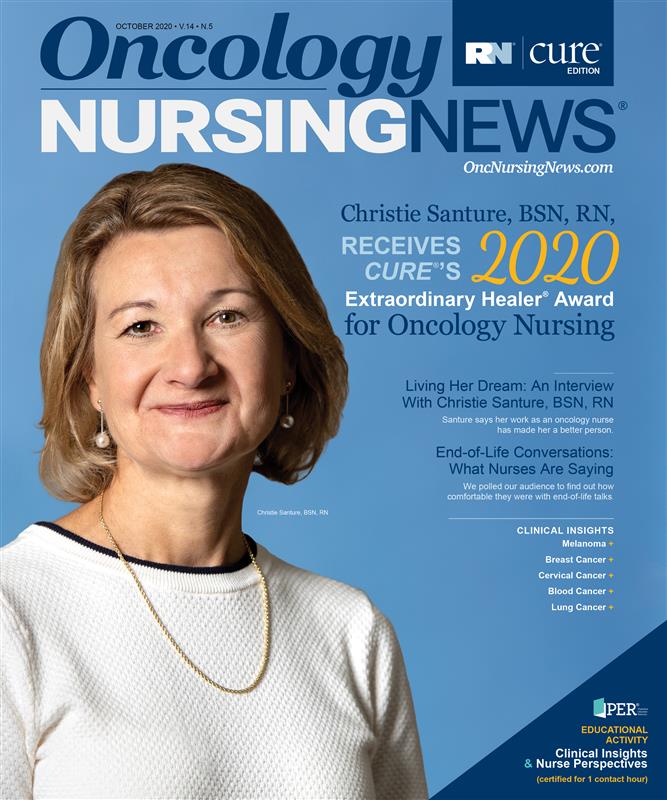
Cancer Care During COVID-19: Nurses Share Their Perspectives
The pandemic may elicit fear, but nurses’ dedication to their patients remains steadfast.
Oncology nurses are special beings, for the job requires a heart of gold to care for patients with cancer. The field of cancer is tough: Nurses assist patients and their families through the stress of diagnosis and treatment, as well as the uncertainties of cancer, death, or survival.
Nurses are entrusted with the treatment and prevention of infections, too, since most oncologic treatments cause immunosuppression.1 However, coronavirus disease 2019 (COVID19) has brought new challenges to our care, because we must increase our vigilance to prevent infection. This increased surveillance occurs prior to and during patient treatment and again at follow-up visits, not only for patients, but also for family members and staff.
In addition to addressing their patients’ physical needs, oncology nurses often are also more emotionally vested in their patients than nurses in other fields, partly because treatment protocols are intensive and prolonged. They listen to patients’ concerns and, based on their specific needs, refer them to available resources in the community.2
Oncology nurses are viewed as educators, counselors, and acquired friends. As teachers, they develop a special bond when caring for patients. Knowledge of the patients and their treatment regimens helps provide better individualized care.2 As acquired friends, they develop a loving bond with patients and their families, helping to celebrate joyous occasions and surmounted obstacles, as well as being there for demises. This special attachment sometimes extends beyond the walls of treatment facilities.
We interviewed 8 oncology nurses in the hematology oncology clinic and treatment unit to gauge their emotional responses to caring for this population during the pandemic. Their worries and perspectives include:
  FEAR OF EXPOSURE. Nurses feel they are taking a risk, because asymptomatic people can carry COVID-19 without even knowing it. They dread the possibility of infecting themselves and their family members, which may include sick parents or asthmatic children.
  FATIGUE. Nurses admit that the exhaustion often is more mental than physical, because they are more aware of their surroundings and precautions than ever. They ensure they are wearing the recommended personal protective equipment recommended by the Centers for Disease Control and Prevention. This can come at the price of physical ailments such as headache, shortness of breath, and skin allergies. Constant use of strong disinfectants can aggravate their ailments.
  FEAR FROM PATIENTS. As patients’ apprehension increases about their safety during treatments, nurses are subjected to questions regarding hand hygiene, glove wearing, and cleanliness of equipment. This has taken a toll on their psyche, and they may feel patients view them as a “Typhoid Mary.”
  INCREASED EMOTIONAL BURDEN. The nurses empathize with patients overwhelmed with anxiety and fear of going to the hospital even if they become sick or develop neutropenic fever. Nurses may have to treat cases more aggressively when treatment is delayed, which, in turn, increases patients’ fear of disease progression. If patients’ support systems are fragmented because family or friends are not allowed to accompany them to visits, nurses step up to provide more emotional support.
  LACK OF PERSONAL TOUCH. A paradigm shift occurred from physical to telehealth visits. Although some patients embrace the technology, others feel a sense of disconnect and report being distracted by dog barking, a child’s scream, or a telephone ring. In addition, many yearn for the reassurance of a physical exam.
On a positive note, nurses report that, even during these troubled times, they’ve been able to discover new passions, such as reading, gardening, petting, baking, dancing, and sewing.
COVID-19 is unprecedented and defies the best scientists. It affects businesses, organizations, health care institutions, and individuals of all social status. In these unparalleled times, oncology nurses have a duty to provide the best quality and compassionate care to patients. As Brenda Nevidjon, MSN, RN, FAAN, said, “We can’t touch each other, but we can still touch lives.”3
References
- Cancer prevention: Oncology nurses save lives by raising awareness. ONS Voice. January 1, 2019. Accessed August 21, 2020. http://www.voice.ons.org/news-and-views/cancer-prevention-oncology-nurses-save-lives-by-raising-awareness
- The 3 “other” roles of an oncology nurse. Catawba Valley Medical Center. April 2018. Accessed August 21, 2020. https://www.catawbavalleyhealth.org/Medical-Center/About-Us/News/2018/April/The-3-Other-Roles-of-an-Oncology-Nurse.aspx
- Nevidjon, B. We can’t touch each other, but we can still touch lives. ONSVoice. August 3, 2020. Accessed August 21, 2020. https://voice.ons.org/news-and-views/we-cant-touch-each-other-but-we-can-still-touch-lives

Latest Conference Coverage

Less Than Half of Recently Approved Cancer Drugs Show a Clinical Benefit

Cadonilimab Plus Chemo Provides Survival Benefit in Gastric/GEJ Cancer

Lenvatinib Plus Pembrolizumab Improves Survival in Advanced/Recurrent Endometrial Cancer

Frontline Durvalumab Regimen Improves PFS, Responses in Advanced Endometrial Cancer
2 Commerce Drive
Cranbury, NJ 08512
All rights reserved.